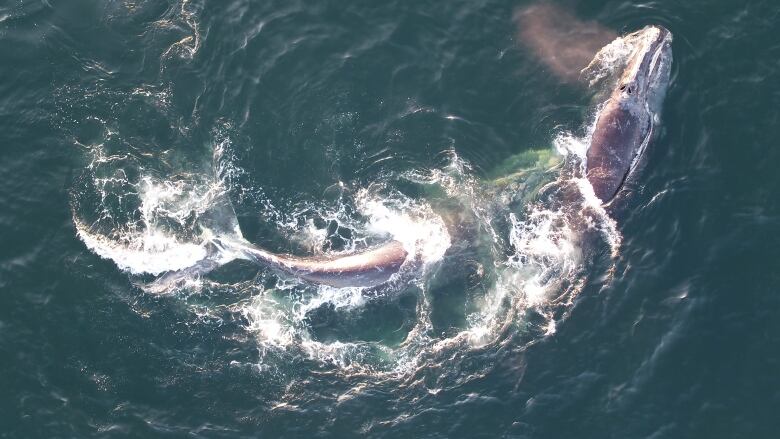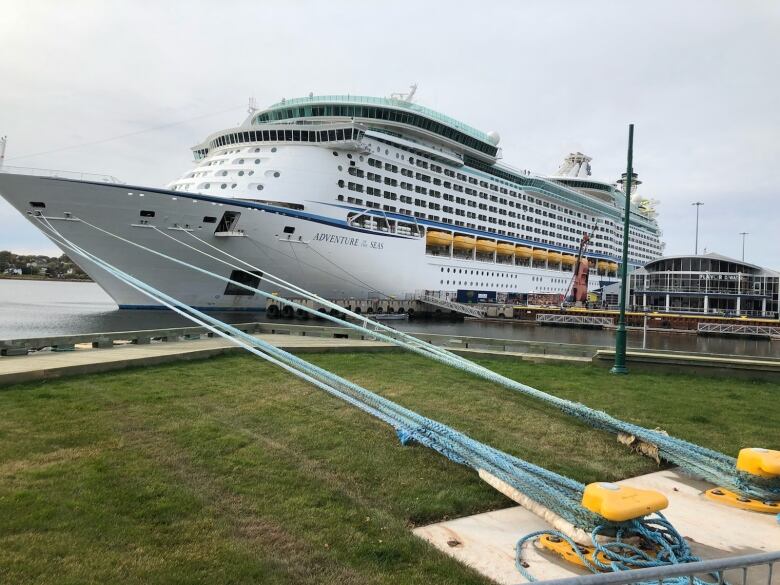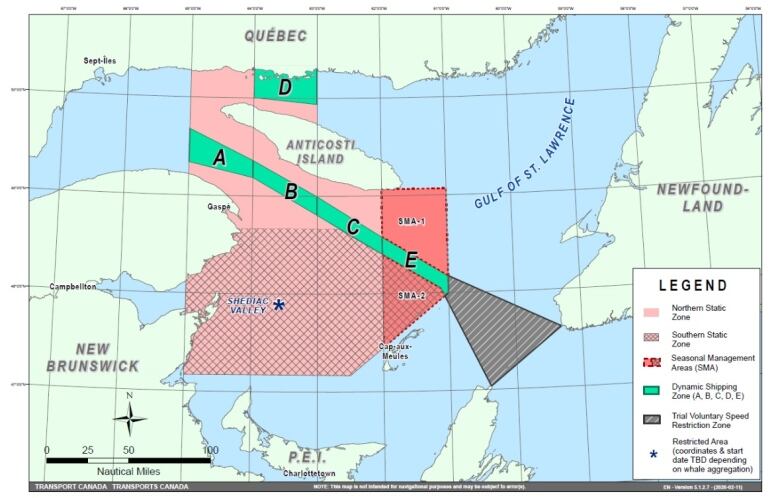Feds asking ships to slow down in Cabot Strait to protect right whales
Transport Canada is working with ferries, cruise and shipping companies to trial voluntary slowdowns

Transport Canada is trying a new voluntary speed limit in the Cabot Strait as a part of its plan to protect the endangered North Atlantic right whale.
First announced in February, the voluntary speed limit would see vessels over 13 metres long slow down to 10 knots in a portion of the Cabot Strait between April 28 and June 15, and Oct.1 and Nov.15, whichare the times of year the right whales are believed to travel through the strait.
There are only about 400 North Atlantic right whales worldwide and there were eight confirmed right whale deaths in Canadian watersduring last year's fishing season.
Michelle Sanders, the director of clean water policy at Transport Canada, said trying voluntary measures will help determine the risks around imposing aspeed limit in the Cabot Strait.
"We do know that for some of the smaller communities and for the cruise industry,a mandatory slowdown could have a significant impact on some of their routes," she said.

In 2017, some cruise ship stops in Charlottetown were cancelled, with some trips being diverted to the Port of Sydney in Cape Breton, after mandatory speed reductions were instituted in the Gulf of St. Lawrence.
"We were able to welcome those ships to our port because it just didn't allow the time to get to some of the other destinations," said Nicole MacAulay, cruise and administration officer with the Port of Sydney.
"Now it's a bit of a different scenario now that they've expanded the restriction into the Cabot Strait, so a little closer to home."
So far, both the Port of Sydney and Port of Charlottetown's cruise ship schedules have not changed.
Unpredictable weather
Sanders said the weather in the Cabot Strait can be severe and sometimes unpredictable, which means slowing down might not always be possible.
"Especially at those times of year at the beginning and the end of the season, the weather can be really challenging," she said. "We don't want to put the vessel or the crew at risk."
Darrell Mercer, communications officer with Marine Atlantic, agrees.
"Our vessels, they have stabilizers that help when the weather gets a little rough," he said. "Those stabilizers don't work as effectively at 10 knots as they do at a higher speed."

Sanders said the ferry routes don't go through the voluntary speed-reduction zone, but the government is in talks with Marine Atlantic on slowing down in the Cabot Strait during the trial period.
The zone starts where the Cabot Strait bottlenecks. It spans roughly from Cape North in Cape Breton to just west of Port aux Basques in Newfoundland and Labrador, and then spans west to meet other restricted zones in the Gulf of St. Lawrence.
This isn't the first time Transport Canada has tried a voluntary slowdown. In 2019, the federal government announced an expansion of a voluntary speed limit in British Columbia as a measure to protect southern resident killer whales.
Other measures
Another measure impacting the Cabot Strait and Gulf of St. Lawrence is the government's push to get more marine mammal observers on board vessels throughout the region.
Sanders said Transport Canada and the Department of Fisheries and Oceans are working closely with shipping companies, cruise linesand ferry operators to get trained observers on board. Sanders believes ferry operators in particular can play a key role in collecting data on the whales and having observers on board would also help prevent collisions with the whales.
That's something Marine Atlantic already started to implement last year. The Crown corporation now has its own marine mammal observer training course as a part of its marine mammal management plan.
MORE TOP STORIES












_(720p).jpg)


 OFFICIAL HD MUSIC VIDEO.jpg)
.jpg)



























































































